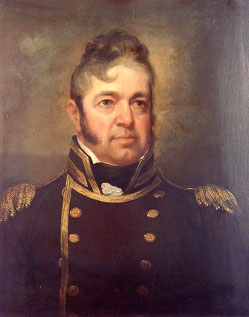| William Bainbridge  Born: 7-May-1774 Born: 7-May-1774
Birthplace: Princeton, NJ
Died: 27-Jul-1833
Location of death: Philadelphia, PA
Cause of death: unspecified
Remains: Buried, Christ Church, Philadelphia, PA
Gender: Male
Race or Ethnicity: White
Occupation: Military Nationality: United States
Executive summary: Commodore, War of 1812 Military service: US Navy (Commodore) William Bainbridge, commodore in the United States Navy, was born on the 7th of May 1774 in Princeton, New Jersey. At the age of fourteen he went to sea in the merchant service, and was in command of a trading schooner at an early age. The American trading vessels of that period were supposed to be excluded by the navigation laws from commerce with the British West Indian Islands, though with the concealed or very slightly disguised assistance of the planters, they engaged in a good deal of contraband commerce. The war between France and Great Britain tended further to make the carrying trade of neutrals difficult. Bainbridge had therefore to expect, and when he could to elude or beat off, much interference on the part of French and British cruisers alike. He is said to have forced a British schooner, probably a privateer, which attacked him when on his way from Bordeaux to St. Thomas, to strike, but he did not take possession. On another occasion he is said to have taken a man out of a British ship in retaliation for the impressment of an American seaman by H.M.S. "Indefatigable", then commanded by Sir Edward Pellew. When the United States Navy was organized in 1798 he was included in the corps of naval officers, and appointed to the schooner "Retaliation." She was on one occasion seized by the French but afterwards released. As captain of the brig "Norfolk" of 18 guns, he was employed in cruising against the French, who were as aggressive against American commerce as the English. He was also sent to carry the tribute which the United States still condescended to pay to the dey of Algiers, in order to secure exemption from capture for its merchant ships in the Mediterranean -- a service which he performed punctually, though with great disgust. When the United States found that bribing the pirate Barbary states did not secure exemption from their outrages, and was constrained at last to use force, he served against Algiers and Tunis. His ship, the "Philadelphia", ran aground on the Tunisian coast, and he was for a time imprisoned. On his release he returned for a time to the merchant service in order to make good the pecuniary loss caused by his captivity. When the war of 1812 broke out between Great Britain and the United States, Bainbridge was appointed to command the United States frigate "Constitution", in succession to Captain Isaac Hull. The "Constitution" was a very fine ship of 1533 tons, which had already captured the "Guerrière." Under Bainbridge she was sent to cruise in the South Atlantic. On the 29th of December 1812 he fell in with H.M.S. "Java", a vessel of 1073 tons, formerly the French frigate "Renommée." She was on her way to the East Indies, carrying the newly appointed lieutenant-governor of Bombay. She had a very raw crew, including very few real seamen, and her men had only had one day's gunnery drill. The United States Navy paid great attention to its gunnery, which the British navy, misled by its easy victories over the French, had greatly neglected. In these conditions the fate of the "Java" was soon sealed. She was cut to pieces and forced to surrender, after suffering heavy loss, and inflicting very little on the "Constitution." After the conclusion of the war with Great Britain, Bainbridge served against the Barbary pirates once more. During his later years he served on the board of navy commissioners. He died on the 28th of July 1833.
Do you know something we don't?
Submit a correction or make a comment about this profile
Copyright ©2019 Soylent Communications
|